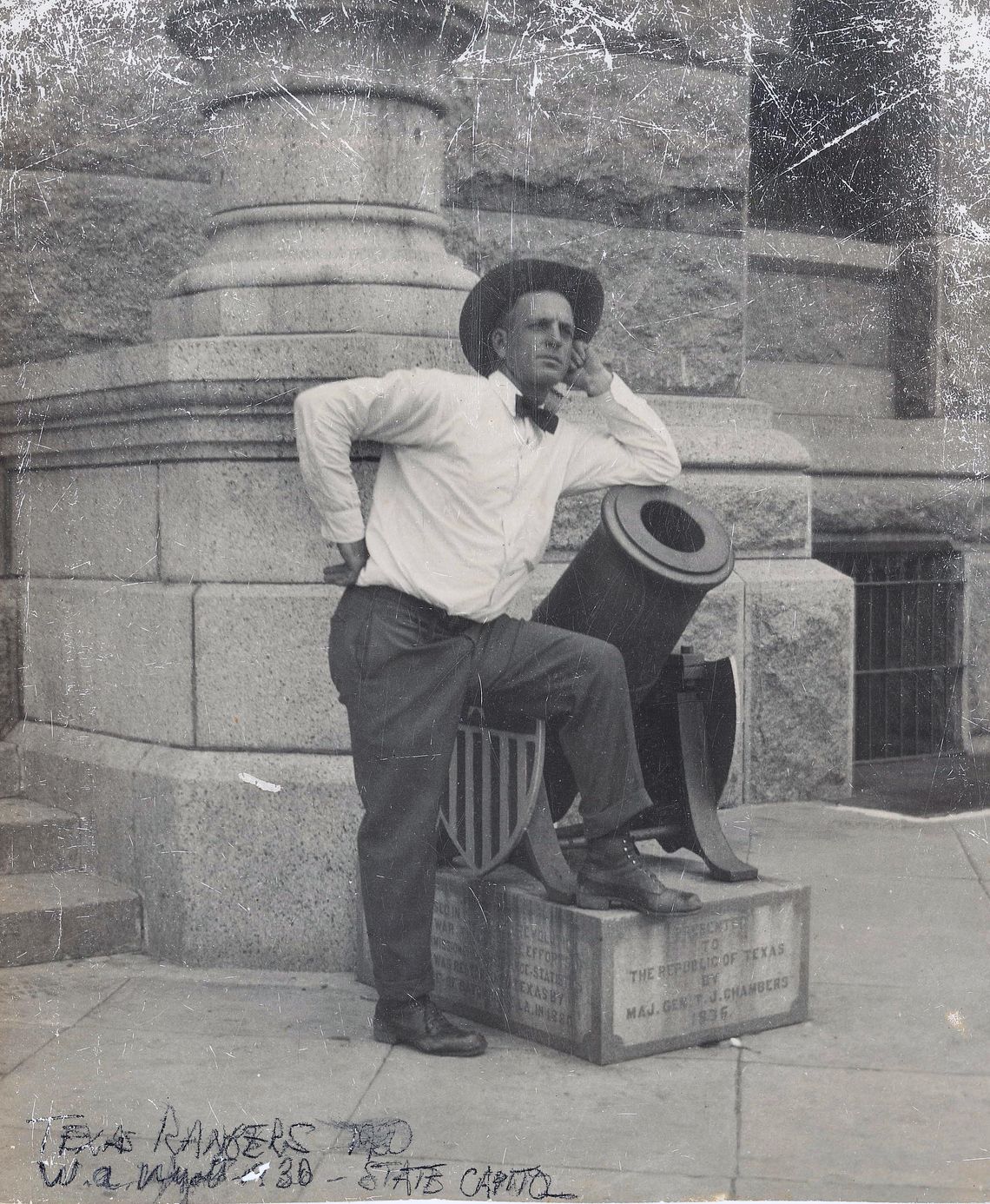The Texas Rangers are the oldest state law enforcement agency in North America. They are part of both the history and mythology of the Old West.
Their legacy began with the earliest settlements in Texas and, over the years, a distinct Ranger tradition has evolved. As former Ranger Capt. Bob Crowder once put it, “A Ranger is an officer who is able to handle any given situation without definite instructions from his commanding officer, or higher authority. This ability must be proven before a man becomes a Ranger.”
That’s why, today, members of the Former Texas Rangers Association honor the lives of former Texas Rangers’ with memorial cross dedications. One such former Texas Ranger, William A. Wyatt Sr., was honored in a dedication ceremony in February at the San Marcos Cemetery.
William A. Wyatt Sr. went by several names throughout his life, “Will A.,” and “Shorty” — due to his short and solid stature — just to name two.

Retired Texas Ranger Joe Davis and Jaxon Moon, a great-great grandchild of William A. Wyatt Sr.
William A. Wyatt III, the grandson of Wyatt Sr., learned a lot of what he knows about his grandfather through stories his father told him and lots of documents; documents kept by his father and by his grandmother, Tula Townsend Wyatt — a woman known for her ability to collect local history, so much so that the San Marcos-Hays County Collection at the San Marcos Public library is named the Tula Townsend Wyatt Collection, due to the extensive collection of photographs, manuscripts, newspaper clippings and other materials she donated.
“He was a tough old bird, that’s for sure and he was always good to me,” Wyatt III said. “But he died when I was 16, I was pretty young. So I did get to know him, but not like I wanted.”
Wyatt Sr. was born to James and Martha Wyatt in Fort Gibson, in what was known as Indian Territory in Oklahoma in 1887. His mother passed away when Wyatt Sr. was just 3 years of age and shortly after, he and his family packed up and moved to Texas. The family settled on 640 acres of land in Seminole, Texas, where they opened a general store in addition to running a ranch, according to Wyatt III.
In 1900, two large ranches were established north of Seminole. Wyatt Sr. and his brother began working part time at the one, while keeping an eye out for future ventures. In 1906, Wyatt Sr. moved to Arizona and purchased three sections of land and started cultivating a successful ranching business. During this time, his interests turned to the Forest Ranger Service in Arizona, where he worked to survey the Coronado National Forest.
Wyatt Sr. also spent his time frequently traveling to Alpine, Texas, where local rancher Everett Townsend sold the Wyatts’ cattle. Townsend was a wellrespected man, as he was not only a sheriff and a state representative, but a Texas Ranger and, perhaps most notably, the Father of Big Bend Park. But for Wyatt Sr., he was most importantly the cousin of Tula Townsend.

Wyatt Sr. worked for the Lower Colorado River Authority for 10 years before retiring in 1956.
Tula and her mother would spend summers visiting Everett, and it was during one of these trips that she met Wyatt Sr. An instant connection led the young couple to write each other frequently.
But the couple’s future was placed on hold as the United States found itself on the verge of war in 1917. World War I was in full effect overseas, and Wyatt Sr. decided to enlist in the Artillery Unit of the Army — though he would never see battle as his tour of duty was cut short when his training camp, Camp Kearney in California, was infiltrated and his entire battalion was poisoned. After recovering, Wyatt Sr. returned to Arizona and he and Tula picked up where they left off. In 1920, he moved to San Marcos and they were married.
They lived on a piece of land off of Old Ranch Road 12, where they raised cattle and goats and welcomed their son, William A. Wyatt Jr., in 1922.
Wyatt Sr., according to his grandson, wasn’t quite able to shake his desire of adventure and applied to the Texas Rangers in 1925. He was assigned to Company A in Del Rio, which meant long periods of time away from his family.
In 1927, he made his way back to San Marcos and his family, but was still unable to shake his sense of adventure and service, so in 1930, he once again applied and was accepted to the Texas Rangers. The assignment kept him closer to home as he was assigned to the state capitol in Austin, where he worked directly with Adjunct General William Sterling. He served. until 1933, when he resigned due to cuts to the Texas Rangers made by the governor.
The years following, Wyatt Sr. served as the post commander of the local American Legion and dedicated himself further to the Masonic Lodge of Hays County. In 1945, he found himself working for a new entity that was gaining importance within the state, the Lower Colorado River Authority. Working as the assistant coordinator of rural electrification, Wyatt Sr. worked in obtaining easements that would impact future water conservation and energy efforts.
Retiring in 1956, Wyatt Sr. spent his later years with his wife while serving the Presbyterian Church and Masonic Lodge. He passed away in 1966.
On Saturday Feb. 22, his family and members of the Former Texas Ranger Association honored his memory with a Memorial Cross Dedication. The mission statement of the Former Texas
Rangers Association, in part, is to preserve the history of the Texas Rangers and to provide landmarks relating to Texas Rangers. The marking of the Rangers’ graves fulfills that part of their mission. For more information on Texas Ranger Memorial Cross Dedications, go to TRHC's website.









